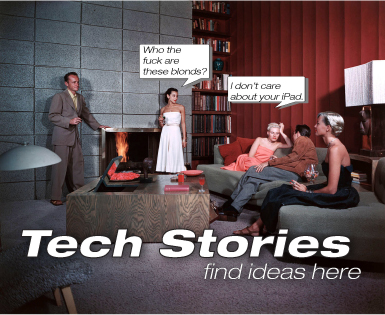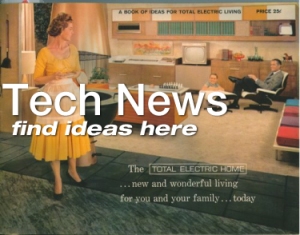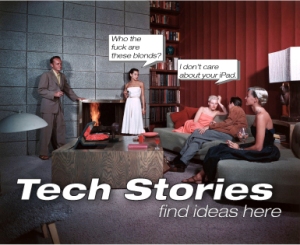“Tech Stories: find ideas here” is a weekly post that aims to collect articles relevant to the future of New Media Fiction. Articles are collected from across the web and tend to focus on resources, ideas or trends that I feel may have a tangential or concrete impact on narrative fiction and the shape it may take.
Forget Ads In Books, Lit-Lovers Face An Even More Hideous Prospect
I have to say that this strikes me as one of those “good problems,” not the “bad.” Information, as my friend Josh Anish has always said, “wants to be free.” It’s why people go to Barnes and Noble and put books in their bags rather than pay for them. In this case, like the music industry, the publishing industry has struggled to monetize their products in the age of the Internet. Rather than ads appearing on the page being read, I’d suggest they come at the end of chapters, which will, inevitably, encourage writers to compose shorter chapters, which is, of course, what readers seem to prefer. An ad at the end of a chapter may very well be the best way to earn money off of books and it also necessarily suggests that books must be presented in digital formats with the ability to provide links to other sites and applications. This small bit of interactivity may also encourage other forms of narrative and even allow for product placement in books themselves. It’s a new world!
In recent months it’s been impossible to open a newspaper or magazine without being drenched by a tidal wave of “waaaaah”s and “woah”s and “oh my God we’re all doomed”s from those of us who make our living selling words. If it’s not newspapers – the fall of advertising! the rise of paywalls! the death of columnists! the birth of citizen journalists! – then it’s magazines – no more long-form writing! the iPad! – or movies – piracy! Netflix! – or cable news – Twitter! YouTube!
This week it’s books (again), and a stark warning from the Wall Street Journal’s Ron Adner and William Vincent to anyone who prefers literature unsullied by full-page ads for SUVs and tobacco.
For the Class of 2014, No E-Mail or Wristwatches
Holy shit! This is great!
1. Few in the class know how to write in cursive.
10. Entering college this fall in a country where a quarter of young people under 18 have at least one immigrant parent, they aren’t afraid of immigration…unless it involves “real” aliens from another planet.
19. They never twisted the coiled handset wire aimlessly around their wrists while chatting on the phone.
20. DNA fingerprinting and maps of the human genome have always existed.
27. Computers have never lacked a CD-ROM disk drive.
28. They’ve never recognized pointing to their wrists as a request for the time of day.
32. Czechoslovakia has never existed.
40. There have always been HIV positive athletes in the Olympics.
43. Russians and Americans have always been living together in space.
44. The dominance of television news by the three networks passed while they were still in their cribs.
46. Nirvana is on the classic oldies station.
51. Food has always been irradiated.
68. They have never worried about a Russian missile strike on the U.S.
71. The nation has never approved of the job Congress is doing.
Lady Java Video Marks Exact Point Where Geek Culture Jumped The Shark
Geek culture strikes me as an interesting concept, if not an interesting truth. With movies such as the Social Network coming to a theater near you and the promise of one focused on Google, geek culture is a real thing. It’s also become the dream and aspiration, so far as professions are concerned, of many of today’s youth. We no longer want to be astronauts. Instead, we want to create our own tech companies. Why is this here? There are new characters, and the technologies they create will drastically impact the art we produce.
Continue reading








